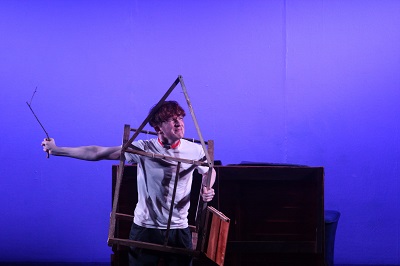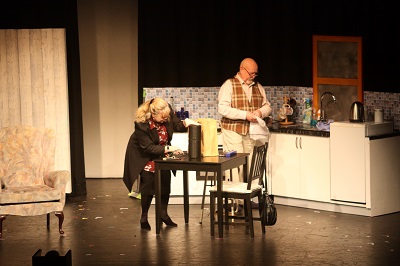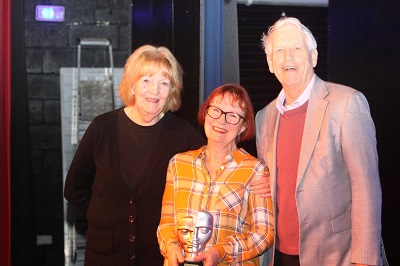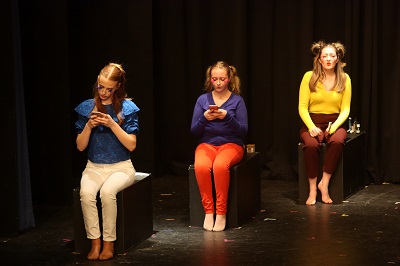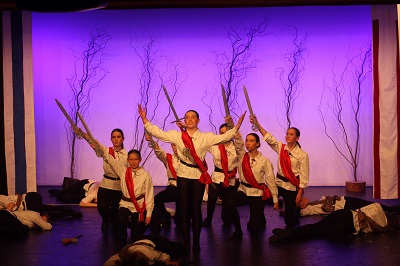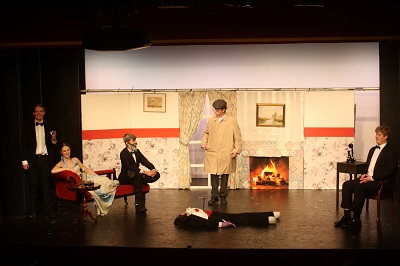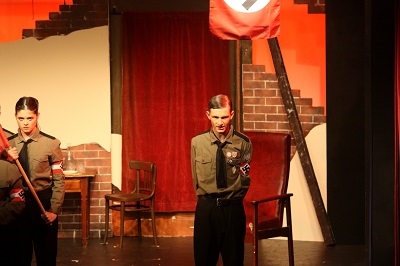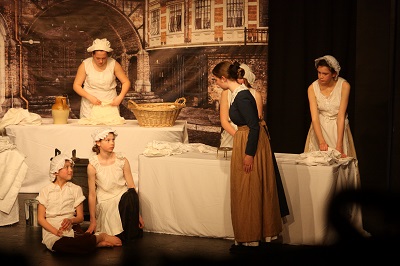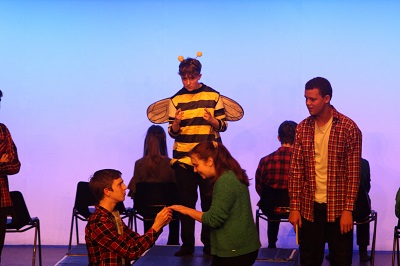
The
Barn Theatre,
25 Bluehouse Lane, Oxted, Surrey
RH8 0AA.
Tel:
01959 561811
Email: barntheatre
@btinternet.com

Southern Counties Drama Festival 2023
Click here to search this site
20th - 25th February
Andrea Oxlade, (Host for the SCDF) introduced us to our Adjudicator for the week, Julie McLoughlin, who was making her first appearance at the Barn as Festival Adjudicator.
The plays in this year's festival were all of an extremely high standard. They benefitted from excellent feedback from the adjudicator who also took time to informally chat with Directors and actors both before and after the shows which was greatly appreciated.
And so to the first of the plays...:
Monday 20th February
“Survivors” by Wendy Reynolds performed by No Frills TheatreThis piece consisted of two long monologues – one of nearly 30 minutes and one of 15 minutes – in which the respective actors related unconnected stories of their own experience of brutal domestic violence and abuse. The design, using just a short depth of the stage on which were placed three chairs in which the characters sat or moved round, restricted movement, presumably to increase intensity. These features created considerable challenges for the actors, not only to maintain their verbal production for such a long period without the benefit of cues or interactions, but also to keep the audience’s attention through their movement and emotional pace. Both actors pulled off this challenge to a considerable degree. Ewezina Krzmien had strong physicality and a convincing display of despair, turning to anger, and used the very restricted space allowed to her with good effect. Harry Reader switched effectively from a desperate anxiety to near manic laughter, and back, although at times his performance might have benefited from a director’s advice to turn down the dial a little. The two stories certainly hit home as separate narratives but the deliberate structure of the script that meant there was no interaction, let alone conflict, between characters, limited the extent to which the piece could be considered dramatic. It seemed that the writer above all had a message to convey. It was an uncompromising way to start the week.
“Hancock's Last Hour” by Zac Thraves performed by Oast Theatre, Tonbridge
This play imagines the time leading up to the suicide, whilst on tour in Australia in 1968, of the British comedian, Tony Hancock. Zac Thraves, who played Hancock as well as being the play’s author, displayed great stage presence throughout. Wisely, he resisted a crude impersonation of the actual Hancock, thereby creating an authentic character. His was a powerful and convincing performance throughout. There was great humour when he railed against the success of Kenneth Williams, whom he felt was stealing the limelight from Hancock’s shows. Ashley Munson and Frankie Gahan played three parts each but they were most effective as, respectively, the writers Alan Simpson and Ray Galton. Their scene with Hancock displayed imaginative use of space, great pace and excellent comic timing. Although many in the audience will have known that Hancock’s despair and self-doubt led inevitably to his suicide, the increasing tension towards his eventual overdose was skilfully managed. There was poignancy when the actor scattered pills onto his desk (with some rolling authentically onto the floor) and then determinedly washed them down with alcohol. We were then shocked by Hancock’s dramatic collapse before he dragged himself into bed to die.
Nominations for Best Adult Actor – Zac Thraves (Tony Hancock) & Ashley Munson (Sid/Alan Simpson/Floor Manager)
Tuesday 21st February"The Rats” by Agatha Christie performed by BiteSize Drama
Our second evening opened with this Agatha Christie play. A pair of adulterous lovers, Sandra and David, are separately lured to an apparently empty flat. It soon becomes apparent it is a trap set by the mysterious Alec, and they are to be framed for the murder of Sandra’s husband. The play was first performed in 1961 and the period was faithfully adhered to in the costumes, hair styles and, above all, ways of speaking of the time. Elizabeth McCreadie, as Sandra, had perfectly captured the authentic accent and timbre for her voice. Her pronunciation of “telephone” and “budgerigar” were memorable! Elizabeth’s movement and facial expressions also illustrated how well she had absorbed the character as written by Christie. Steve Hemsley, as David, with good stage presence, was equally convincing as the initially suave and confident man who soon turns to panic and self-preservation when feeling threatened. The physical interactions between the two were natural and convincing, going from initial embraces to a well-timed slap in the face and the hint from David of being on the edge of violence towards Sandra. Sheila Bramley, as Jennifer, played a good supporting role to enable the plot to be developed. Guy Perkins, as Alec, was suitably rather weird and sinister, although the white gloves he needed to wear to avoid leaving fingerprints looked incongruous. If Christie’s ending seemed a little obvious to the contemporary eye, Sandra’s hysterical and terrified laughter as she realises they are the rats in the trap provided a memorable climax.
“Slavey” by Sigrid Gilmer performed by Disaster Class
Disaster Class is a company of young adults and they presented a challenging piece comprising ten performers. It is hard to summarise the plot because the script gave us few if any clues. Ted, played with a fervent energy and excellent comic timing by Kieran O’Brien, is a ‘Slavey’, seemingly a robot or avatar engaged to perform domestic tasks in the home of Nora and Robert Smith. Tabitha Crocker, as Nora, gave a convincing and mature performance as a posh and imperious middle class woman whose insecurities are eventually exposed. There was no explanation as to why the Smith’s daughter (played with great physical energy by Amelie Bardsley) behaved in the family home as if a pet dog, with a fervent degree of yapping, nor why Ted had manic conversations with a stick! One was left with the uneasy feeling that the writer had deliberately set out to disconcert the audience with mystification for its own sake. In amongst the chaos, Sam Webber and Oscar Covallero were cleverly obnoxious and well co-ordinated as a pair of drunks giving callous advice on how to discipline a Slavey. There was great effort and energy from all the performers but communication of this difficult piece was sometimes let down by less than clear diction.
Nominations for Best Adult Actress - Tabitha Crocker (Nora Smith) & Amelie Bardsley (Sonny Smith), Best Adult Actor – Kieran O'Brien (Ted), Adjudicator’s Award - Dominic Semwanga for everything, Martin Patrick Award for Best Director - Dominic Semwanga and Best Adult Production
Adjudicator’s Award - Dominic Semwanga for everything
“Isla” by Tim Price performed by The Mitre Players
This play performed one of the very basic purposes of theatre: it made the audience laugh - a lot. It did so because it found the humour in two experiences familiar to all – the challenges of the Covid lockdown for those living alone and the increasing ‘relationships’ we have with voice activated digital assistants. Roger, an elderly widower, lives alone. As the lockdown commences, his daughter, Erin, installs ‘Isla’ in his home to assist Roger to cope with his loneliness. David Morgan’s performance as Roger is of the very highest quality. He is in turn both comic and tragic in his interactions with Isla, combining pathos with his memories of his dead wife and a childlike delight in finding increasingly extreme ways to swear at Isla, just for the fun of it. His timing is immaculate and his physicality and domination of the stage is immense. Penelope Brown provided the voice for Isla with perfectly authentic pitch and tone. She also doubled as the politically correct Police Constable Jones, whose deadpan humour as she seeks to educate the bewildered Roger as to why he must not use sexist language to Isla was a joy to see. The interactions between Roger and Erin (played by Nicky Chambers) were pacy and well balanced, particularly in their clashes and arguments. A word must also be made about the set. This representation of Roger’s kitchen would not have disgraced a properly constructed set for a theatre run. To have it erected in the few minutes allotted was a great tribute to its designer and constructors.
Nominations for Best Adult Actor – David Morgan (Roger) and Best Adult Production
Wednesday 22nd February“Letters of Last Resort” by Robert Wilding and Barney Sayburn performed by Trinity Drama
Robert Wilding and Barney Sayburn together wrote this piece and performed in the two leading roles. Its plot was commendably straightforward. What would happen on board one of Britain’s nuclear submarines if they were informed that nuclear war had broken out and the sealed order from the Prime Minister (the letter of last resort) ordered them to retaliate? The crew of three struggled with their moral dilemmas as the arguments went back and forth. Twice a missile launch was aborted just in time as military discipline broke down and the conflicts heightened. There is also a suspicion that one of their number is a Russian spy bent on sabotage. The script was fast paced, and all three handled this well, occasionally inserting some well-timed humour. The play worked best when there was plenty of physical action, including some well-crafted fight scenes, whereas the moral debates were sometimes a little static. The dramatic conclusion was well handled and not overplayed. All in all this was a well-conceived and clever piece with a minimal but highly imaginative set. On this evidence, Robert and Barney should definitely continue to develop their writing skills.
Nominations for Best Young Actor – Barney Sayburn (Radio Officer Lawe) and Adjudicator's Award - Robert Wilding & Barney Sayburn for text of Letters of Last Resort
“A Respectable Funeral” by Jimmie Chinn performed by ACE Theatre Company
The four performers in this piece got everything they could out of this play, written some forty years ago and feeling a little dated. Three middle aged sisters, joined later by their brother, gather in their dead mother’s house, immediately after her funeral. Evadne (Win Duggan) and Joyce (Christine White) began with skilfully delivered and well timed repartee. Evadne, in particular, showed a strong command of the script and of the stage and her physical reactions and facial expressions were well crafted. Joyce’s story telling about both her and her mother’s secrets showed the right amount of naughty delight in the revelations. Greta (Karen Hunt) showed good skill in handling one of the more difficult tasks for an actor – to become convincingly more drunk as the play progressed. Charlie (Colin White) had to play the serious one of the siblings and he handled this well, as he revealed his intentions to take over the house the other three thought would be sold to provide them each with a nest egg. Where the script required it, Charlie’s voice cracked authentically with pent up emotion.
Nomination for Best Adult Actress - Christine White (Joyce)
“The Final Kiss” by Maurice Level performed by Sevenoaks Shakespeare SocietyHenri (Pierse Stevens) has been hideously disfigured and almost blinded when vitriol was thrown in his face by his jealous lover, Jeanne (Elizabeth McCreadie). The doctor (Ian Burns) and the Nurse (Kate Peters) provide us with the background plot and then leave the stage to enable a highly dramatic scene between Henri and Jeanne. She has been released from prison after a very short sentence (because Henri refused to give evidence against her). It seems she has come to beg forgiveness. It seems he still loves her. Henri’s ability to convey physical agony, emotional pain and tender love – all in the space of a few seconds – was of the very highest order. Jeanne is utterly convincing as she flits between remorse for the man she used to love and revulsion at his disfigurement. He pleads with her to hold her hand: the way she gradually overcomes her reluctance was exquisitely moving. The climax to this play was handled with great skill by both actors. He wants to kiss her. She resists and hurts his face. His anger turns to a terrible revenge in a superbly executed and unexpected climax. The action was perfectly complemented by clever lighting changes on a well designed set. Henri’s make up, when he removes his bandages, was utterly convincing. The energy between these two actors was remarkable and their individual performances were exceptional.
Nominations for Best Adult Actress - Elizabeth McCreadie (Jeanne), Best Adult Actor – Pierse Stevens (Henri), Best Stage Presentation and Best Adult Production
Best Adult Actor – Pierse Stevens (Henri)
Best Adult Production
VERLINGUE FESTIVAL WINNERS AWARD
Thursday 23rd February
"Lord of the Flies” by William Golding performed by Glow Theatre Group
This large cast of eighteen boys and girls aged 11 – 13 combined to give us a vibrant and action packed pared down version of the Lord of the Flies story. Published in 1954, this was Golding’s first novel but its themes still have great relevance today. The stage never seemed overcrowded as the youngsters in their two rival gangs acted out the hostilities and conflicts on a set well dressed with convincing foliage. Virtually everyone knows the story of Lord of the Flies but anyone in the audience who was coming to this new, might have struggled at times to understand what was going on. Ralph (Will Shackleton) showed an acting maturity beyond his years. From the very beginning he confidently owned the stage. His clear diction and projection were excellent. Sam Church gave us a Piggy who mastered his transitions from excitement, humour, frustration and despair in equal measure. Roger (Nathaniel Smith) gave us a well performed progression into sheer nastiness. Will Lambert, as Eric, handled a difficult brief to speak with a stammer with great skill. The dialogue between Simon (Hector Hall) and a pig’s head was clever and well executed. The actors were assisted by an impressive lighting design and a pacy music soundtrack.
Nominations for Best Young Actor – Sam Church (Piggy) & Will Shackleton (Ralph)“The Cagebirds” by David Campton performed by Heathfield Youth Drama
This play was first produced in 1971 but you would not have guessed it was not a modern piece. From the start it challenges its audience not to make assumptions. Are these six players young women trapped in some unexplained way by The Mistress or do their outlandish hairstyles, exaggerated eye lashes and distinctive primary coloured clothes mean they are “really” caged birds? Certainly we are drawn gradually to that conclusion, as they scuttle round the stage in a convincing representation of panicked avians, trilling and warbling to good effect. An evocative and suitably gloomy set reinforced the impression of a claustrophobic cage. The birds have become complacent and have no wish to escape their captivity, despite the best efforts of The Wild One (Lily Damazer), introduced in their midst. She tries without success to persuade them to ‘revolution’ but this does no more than panic them. Lily had good stage presence and projection and, in a demanding part, drove and controlled the drama. The script gave insufficient clues to be able to distinguish in all cases which actress was playing which part but all gave great performances in keeping with the pace of this fascinating piece. Sophie Pin, as the Great Guzzler, displayed excellent comic timing in the delivery of her lines and whoever played the cage bird killed by the others at the end of the play was very convincing as she flitted between finding the courage to escape and reverting to the safety of the cage.
Nominations for Best Young Actress – Sophie Pin (The Great Guzzler) & Libby Thomas (The Regular Thump), Martin Patrick Award for Best Director - Maryjane Stevens and Best Youth Production
“Macbeth” by William Shakespeare performed by Glow Theatre GroupHow could Macbeth possibly be cut down to a performance of less than an hour? In fact, this abridged version worked exceedingly well. All the components of the full length plot were there and it bounced along with great pace. As the programme pointed out, this would have been the first time most of this cast of all female 11 – 13 year olds had tackled Shakespeare but they certainly weren’t intimidated by the text. Right from the opening dance sequence, this play had energy and pace. Thea Stokes, as Lady Macbeth, stood out in her ability to not only deliver her lines with meaning but also to back them up with expressive gestures and movement. The three witches, along with a powerful and sinister Hecate, in their wonderful headdresses, clearly enjoyed themselves, as did Millie Rye, as the drunken Porter. The final battle was impressively choreographed and imaginative changes of lighting brought tension to the right places. This was an impressive performance and all players demonstrated the potential to take on more of the Bard’s work.
Nomination for Best Stage Presentation
Best Stage Presentation
Friday 24th February
“Streuth” by Michael Green performed by Heathfield Youth Drama
This comedy was handled with great verve from start to finish by a very talented cast. The archetypal country house murder goes wrong from the very start and there is not room in this review to list all the hilarious components that had the audience laughing throughout. Ella Slinn Hawkins’ outrageously over the top accent as Mrs D’Arcy, Hubert’s (Joe Jones) inability to deliver any lines without referring to his crib on the inside of his cigarette case, Theo Walker’s (The Inspector) impressive fall off the stage, Libby Thomas’ (The Cook) hilarious over-acting, Miles Temple Jones’ (The Vicar) entry through the fireplace when he couldn’t open the French windows were but some of the gems. Perhaps the biggest laugh came when the ‘Prompt’ (Trav Tasker) announced in panic: “I don’t know where we are”, having lost her place in the script, only for the Inspector to assume this was a prompt for a philosophical line for him to deliver with panache. The play finally disintegrated in a loop of lines they couldn’t get out of (and we’ve all experienced that in our time!). There was immaculate comic timing from all the cast and this showed acting ability of the highest level. All in all, it was tremendous fun.
“The Edelweiss Pirates” by Ayub Khan Din performed by Glow Theatre GroupIt is probably a surprise to most of us that small groups of young people in Germany during the second world war formed into groups that opposed the culture of the Hitler Youth and sometimes extended to an actual underground opposition to the Nazi regime. One such group was the Edelweiss Pirates of Cologne. This play is therefore based on historical fact but the events and characters are imagined. This was a disconcerting piece from the start, with the projection of contemporary film footage featuring the Hitler Youth and the cast singing a disturbing Nazi song. Jacob Conway played a Nazi officer with effective nastiness and the Narrator (Linus Davison), in his archetypal ‘Gestapo’ long leather coat, conveyed a great sense of menace. A brutal set provided additional context. Zak Wheeler, as Dieter, was confident in his role as the effective leader of the Pirates and he delivered a long monologue to the audience with great skill, as his patience, that merely passive resistance was sufficient, ran out. Of other cast members, Rosie Chambers, as Petra, gave a convincing performance, being totally ‘inside’ her role. The fight scene with the SS infiltrator was technically adept. The projection of photos of actual members of the Pirates who had been killed by the Nazi regime was a fittingly moving end.
Nominations for Best Young Actress - Rosie Chambers (Petra Gleissner), Best Young Actor – Pierce O'Brien (Benjamin Dressler) & Linus Davison (Narrator) , Best Stage Presentation, Martin Patrick Award for Best Director - Jackie Driscoll and Best Youth Production
Best Young Actress – Rosie Chambers (Petra Gleissner)
Best Young Actor – Linus Davison (Narrator)
Martin Patrick Award for Best Director – Jackie Driscoll
Best Youth Production
Saturday 26th February (Matinee)“Be Careful What You Wish For” by Jon Boustead performed by Glow Theatre Group
This charming piece for younger players featured a cast of ten and a further ensemble of eighteen. A group of children visit a mysterious castle and find that papers stuck on the walls are wishes written by those who have been before. Two custodians of the castle appear and tell the children that they can each have one wish of their own, which will be granted. Unfortunately, it was not possible to discern the character names of these two parts so this review cannot identify the actresses playing those parts, other than to say that they were the two girls in the blue dungarees. (They will know who they are!). Both performed with great energy and competence and clever moments of knowing irony. As the play’s title suggested, of course the wishes chosen by the children lead to dire and unintended consequences. As amusingly shown by the groans of pain from those who wished for chocolate and ate and ate until they were ill, they were all trapped in their own wishes. This was a well organised piece and the stage never felt overcrowded. The cast clearly enjoyed it and transmitted their enjoyment to the audience.
“The Whole Truth” by Ray Jenkins performed by Heathfield Youth Drama
There were fourteen in this cast of 10 – 12 year olds, plus another eight in support. The setting was a lively school classroom with an absent teacher, giving the pupils full licence to behave without adult control. Their task is to prepare an improvisation and the most dominant of the group (Mason, played by Charlie Wilsher) insists this should be a courtroom, though in truth he has no idea how a court scene should work. The cast enthusiastically portrayed the casual cruelty towards each other often exhibited by children of this age (echoes of Lord of the Flies) and the mocking of one boy with a stammer was disturbing. The actor playing this role stood out in his ability to display emotion and empathetic reaction through his facial expressions. Mason’s plans are going nowhere until he is saved by Billie (played with some skill by Beth Hazen) who, it gradually emerges, knows how courts work because she has been in one as the accused. She tells her own sad story, and that of her unfortunate mother, with convincing pathos. It must have been a matter of some frustration for the joint directors that the cast had to take so many prompts, as this inevitably slowed down the pace of this nevertheless enthusiastically delivered piece.
“The Laundry Girls” by Bill Owen performed by Heathfield Youth Drama
Here was a most impressive set, showing us a commercial laundry of 1899, with props including authentic looking irons of the period. A blown up contemporary photo of an industrial building gave good visual effect. Our four main actresses, Issie Pincus (Alice), Maria Walker Rhymes (Vera), Maddie Clover (Beattie) and Renee Taageb (Gert) took a little time to get going but soon convinced us we were there in that laundry room listening to the trials and tribulations of their exploited lives. Vera, in particular, gave an animated performance and Beattie’s challenges to the boss, Mrs Gimmel (played by Jessica Arnott), were convincingly assertive. The rest of the cast work silently at the back of the laundry (without ever being masked by the main players downstage) but this changes when Little Maggie (Emilia Fisk) faints with hunger and is carried downstage to recover. When she does so, she gives us a moving and convincing story of her desperate family circumstances. Gert believes she has found a way out of her miserable existence through a young man she has met. They are to run off together. Of course, this is never to happen as Beattie reveals the same man had previously promised her the same.
“The Domino Effect” by Fin Kennedy performed by Glow Theatre GroupThis is a modern fantasy play written especially for teenagers, in this case performed by a cast of over thirty, including thirteen taking the Narrator role. The ‘plot’ is impossible to summarise here: suffice to say that life is a series of apparently unconnected unintended consequences. Set in the London Borough of Tower Hamlets, many of the characters are of South Asian heritage, so some imaginative use of costume was required. To accommodate the large cast and the many instant changes of location, the set consisted only of a number of basic boxes or cubes and these were cleverly deployed and appropriately moved. This production had masses of pace. Pace coming on stage; pace going off and economical use of the stage when so many were using it at once. There were some commendable instances of ironic humour – particularly noteworthy was the scene where women mocked the cologne used by one of the male characters. With such a large cast, it is hard to pick out individual performances, but Amelie Torre, as Mrs Khan, caught the eye with her natural timing, stage presence and excellence movement; and Isabelle Shackleton deserves praise for being able to act throughout without speaking as the elective mute, Amina.
Nomination for Best Youth Production
Saturday 25th February“Constellations” by Nick Payne performed by LCA Stage Academy
First produced in 2012, this play traces a romantic relationship between Roland, a beekeeper and Marianne, a physicist. They meet, move in together, split up because of infidelity, meet again by chance and get married. Then Marianne find she has an incurable brain tumour and she explores assisted suicide. The plot is not followed in a linear way and some scenes are repeated but with subtle variations. In this production, a whole new dimension of challenge was introduced by having the two characters each played by five different actors. This was handled through use of a minimal set – chairs and cube blocks – and having the ten actors who at any one time were not performing, sitting with their backs to the audience, while the two ‘active’ ones played out a particular scene. Discordant music was effectively used for the changeovers to the next pair of actors. The actors never missed a cue in these rapid changes and there was generally good delivery and timing of their lines, including the ironic or comic remarks. This was a well-disciplined and well delivered piece, given the additional challenge that had been built in.
Nominations for Best Young Actress - Livvee-Rae Turner (Roland 3), Best Young Actor – Samuel Gower (Roland 1) & Asher Byrne (Roland 4), Adjudicator's Award - whole cast for timing and Best Youth Production
“On the Edge” by Andy Taylor performed by Oast Theatre, TonbridgeHarriet’s house is located on the top of an eroding cliff and the action takes place in her garden. Her neighbour’s house has already fallen into the sea. Thus we are physically on the edge, but, as soon emerges, so too are we emotionally and psychologically. The author of this piece, Andy Taylor, also plays Martin, whose portrayal of a bullying, cruel, mocking, machismo male was utterly convincing in its sheer nastiness, both in his abusive modes of speech and his threatening body language. Even his tattoo gave the right level of narcissism and menace! Martin is Harriet’s brother and he has clearly turned up to make trouble for her and her new male friend, Sebastian (played by Denzil Edwards), who gave us an equally convincing portrayal of a gentle, shy, polite and relatively introverted librarian, but who is prepared to stand up to Martin if he thinks decent standards of behaviour have been breached. Lucy (Lynn Short), traumatised by the loss of her house, spends almost the whole time as a silent, quivering wreck and does this very well. So far, so (almost) normal but things become very dark when Harriet (Cathy Bourne) relates in terrifying and explicit detail, childhood sexual abuse at the hands of her brother. The twist at the end when she and Martin revert to their perverse relationship is shocking, even if not entirely convincing.
Nomination for Best Adult Actress - Cathy Bourne (Harriet)
Jill Perry Award for Best Adult Actress – Cathy Bourne (Harriet)
Reviews by Peter Shore
Photos by Mike Sutton

